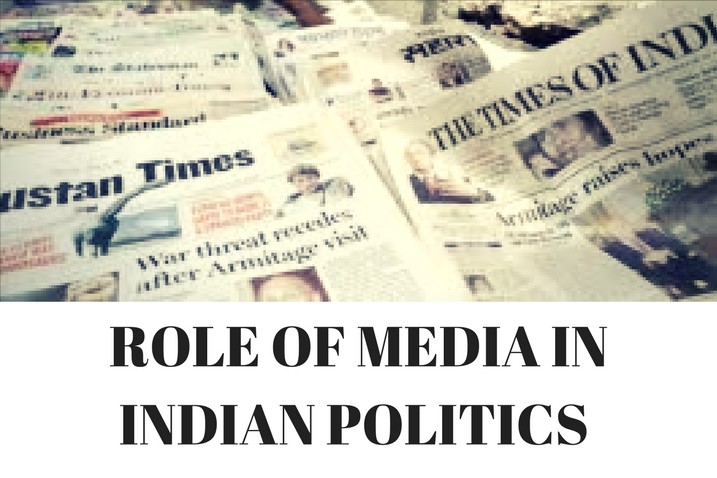ROLE OF MEDIA IN INDIAN POLITICS

Posted On - 11-04-2018
Role of Media in Indian Politics
Media plays an important role in politics as it influences public opinion and helps define and take up the issues. It can keep the powerful in check by seeking transparency in their actions. Suppose if a government were to control all the information regarding its own actions, won’t it escape all accountability?
Thus, an independent media is an effective check on government’s power and influence over its citizens. In fact, with the emergence of TV and Radio networks, many governments in Europe and America brought about legislations so that the broadcast media did not deviate from neutral position.
Yet before we dig the issue more, it would be apt to refer to media’s role in defining the political future of our country during the recent elections.
In course of the polls, BJP’s prime ministerial aspirant (Now Prime Minister) Narendra Modi coined an interesting term — ‘news traders’. It was a mocking reference to a section of media hostile towards him and his ideologies. His purpose was clear – to attribute motives to their anti-Modi stories. He even cautioned a news channel editor against “carrying forward” charges levelled by political opponents in the course of an interview.
Wasn’t Modi’s tactic a shrewd political ploy to project himself as a victim of market driven ‘news traders’ more keen on exploring ways to enhance their TRP ratings and advertisement revenue than presenting news in its true form?
There is no doubt that the mainstream media had always been hostile towards Modi after the 2002 Gujarat riots, and he desperately needed a makeover. Though, Modi cleverly cultivated social media as a propaganda tool (isn’t it true that even the Aam Admi Party was a product of Social Media?), by coining ‘media traders’, he launched a well-deliberated counter offensive against the mainstream media. After all, it had a big role to play in Modi’s political scheme of things! And he played by the media rules and succeeded in confounding media.
We all know that media and politics enjoy a symbiotic relationship. Simply speaking, none of the politicians, how powerful they may be, can afford to neglect media. Yet, only those who are media-savvy and know how to play within the media rules can use them to their advantage (The US President Barack Obama is a good example of such media-savvy candidates who understood media’s constraints and could wield a mass appeal).
Compare Modi’s combative appearance in the media with that of the Congress’s Rahul Gandhi’s whose fortunes tumbled after just one shaky appearance in a widely seen television interview. This just one interview of Rahul demonstrated effectively that elections are won or lost over media.
Another fact and that Rahul now well knows, is that media can also veto candidates. The way electronic media blacked out his public addresses if they coincided with that of Modi’s is an ample example. Obviously market considerations such as TRP did play an important factor here as channels noticed more audience for Modi than Rahul.
Yet this too is not a local home brewed trend. Take the case of John Edwards – a US senator and vice-presidential candidate in 2004 and 2008 as well. He, of course, was not a marginal politician and at times even polled better against the potential candidates. But the media rejected him by a combination of ignoring him and subjecting him to much more negative reporting than the other major contenders.
Of course, media has an undisputable role in a democracy. A free media is considered the watchdog of the government. A stock of the media behaviour, therefore, is crucial largely because of the process of agenda setting and gate keeping attached with media. Every media student knows that media acts as gatekeeper in setting the limits for political discussion and sometimes even candidacies for public office.
Internationally, the power of the media to define politics, has been forensically examined. In Western liberal democracies, the governments have been pressured to institute major inquiries into where the buck stops in media governance. It has been a constant endeavour of the torch bearers of free opinion to ensure that media just does not remain a propaganda tool of vested powers but plays a larger role of creating informed citizens with constructive public opinion.
After all, isn’t politics meant for making citizens happy as perceived by the ancient Greek philosopher Aristotle? Wikipedia defines it as the practice and theory of influencing other people on a global, civic or individual level. In nutshell, it is all about creating conducive atmosphere for better governance. And mass communication mediums (or the Media) are instrumental in creating a public perception on polity and governance!
And it doesn’t matter if the trendy shift to ‘news as entertainment’ has become a vogue in recent times!
Courtesy: Election.in





